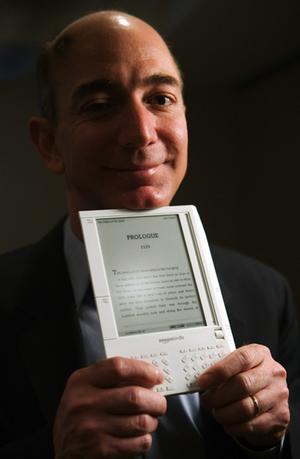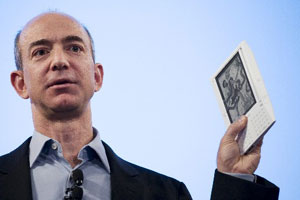[For more on these Kindle investigations, see ten arguments against the Kindle, the initial query concerning blog content being redistributed without permission or compensation, the first wave of Kindle blogger responses, and the the second wave of Kindle blogger responses.]
The upshot is that Amazon did indeed approach bloggers to participate in the Kindle Store. Mac Thomason tells me that Amazon approached him “either late last year or early this year.” Other bloggers, like Deane Barker, were approached largely because of their connection with third party outlets. In Barker’s case, it was Federated Media. (This is similar to what Glenn Reynolds told me about Pajamas Media.) In the case of bloggers who had a third party conduit, they don’t seem to be aware of the terms or even compensation specifics. The general consensus for high-traffic sites, however, is that advertising revenue will dwarf Kindle revenue. Thomason tells me that he’s “not expecting much.”
 Vinography‘s Alder Yarrow feels that “the fee covers the cost of making the content available via wireless access (since there is no monthly access fee). Yes it is a double standard, but some people are willing to pay for convenience.”
Vinography‘s Alder Yarrow feels that “the fee covers the cost of making the content available via wireless access (since there is no monthly access fee). Yes it is a double standard, but some people are willing to pay for convenience.”
If the information wants to be free, at least one Kindle blogger has taken steps to remedy this. Bags and Baggage‘s Denise Howell, whose blog is licensed under Creative Commons, says that she generated “a separate, specific license to Amazon for their project.”
As to whether these bloggers see charging for a freely available RSS feed as a double standard, Barker notes, “I guess I don’t care if someone pays for my feed. I’d let them have it for free if Amazon would let me,” but expresses doubts that the operation will take off. Thomason suggests that because this is a different delivery system, these distinctions aren’t a double standard. “If someone were going to bind my postings up into a book, I’d expect compensation for that as well,” he said. And Thomason observes that his advertising revenue “basically only covers expenses.” So for bloggers in Thomason’s camp, Kindle may be an attractive option to boost revenue.
Howell, who hasn’t had advertising on his site in six years of blogging, begs to differ about this double standard. She wrote to me:
Your argument is like saying that simply because a musical artist makes some material available for free on the Web or as a “download of the day” in iTunes, it’s “a double standard” to ever charge for that work again. Doesn’t hold water. The creator maintains full control over uses (free or otherwise) of the work.
Howell likes the idea that “anyone who wants to can read it on the device.” And while the Kindle presents new possibilities for content delivery and revenue generation, the problem with Howell’s position is that Amazon has, in at least one case, screwed over the creator.
Daniel McGowan, the blogger behind Dan’s Take, tells me that had no idea that Amazon was doing this. McGowan tells me that he was never contacted by Amazon and that he was certainly never compensated by them. But there’s his blog at the Kindle Store.
So it appears, in at least one case, that Amazon has every intention of charging for content that they do not have consent for, and that, in McGowan’s case, they intend to leave him out in the cold while they collect 100% of the revenue. Apparently, not everybody can shout, “Thanks Amazon for all the cash!”
UPDATE: McGowan isn’t the only one being whose content is being sold through Amazon without his permission. Cork Gaines of Ray’s Index just responded to my email. He had no idea that Amazon was doing this until I contacted him. He had this to say:
Maybe two months ago, somebody from Amazon contacted me to tell me there was a problem with my RSS feed. At the time I ignored it, because my feed appeared to be working fine and had never heard any complaints (turns out it was just a quirk with Feed Validator). I wondered why Amazon would want my feed and just assumed they were going to integrate a feed reader on their site someplace in the future. I forgot about it and never followed up to see why. So to answer your question, NO, they never asked permission.
He says he isn’t gaining any revenue from Kindle, but he believes that it could generate new readers for his site, “but my thought is that the only subscribers will be people that are already familiar with my site.”
So that’s two bloggers who Amazon has left out in the cold. How many others are there?
 A true activist stands by his principles. For the record, a few major publishers have offered me considerable money to advertise on Segundo, with the proviso that I only interview their authors. One even suggested that I could download leftover audio snippets of authors from their digital archive and I could edit my questions in. I found this to be quite unsavory, and I politely declined these offers.
A true activist stands by his principles. For the record, a few major publishers have offered me considerable money to advertise on Segundo, with the proviso that I only interview their authors. One even suggested that I could download leftover audio snippets of authors from their digital archive and I could edit my questions in. I found this to be quite unsavory, and I politely declined these offers.  Howard Rheingold, the man behind
Howard Rheingold, the man behind 